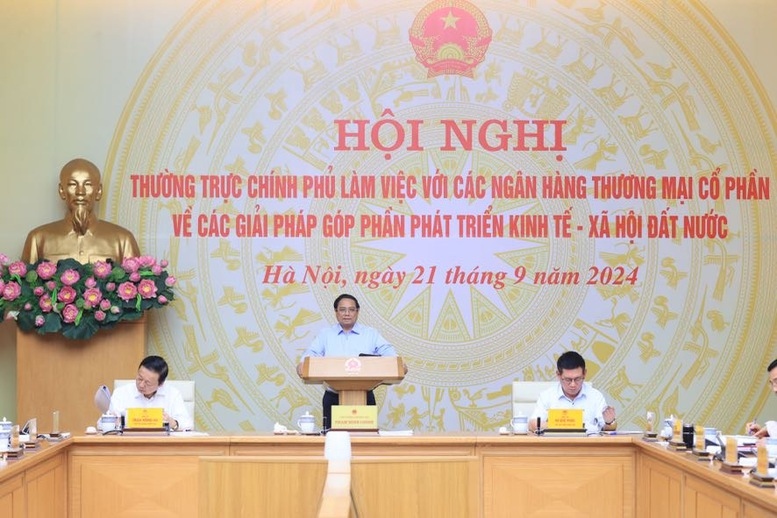
The Government chief asked participants to provide accurate and fair assessments on the monetary policy and macroeconomic management of the Government and the State Bank of Vietnam (SBV), including issues related to liquidity, interest rates, exchange rates, credit room, credit growth, and lending interest rates in the current context. This is along with proposing tasks and solutions relating to monetary policy in the near future.
The nation has so far maintained its macro-economic stability, keeping inflation in check whilst ensuring major balances. However, storm Yagi has caused serious losses in terms of human lives and property, leading to a stagnation in production and business activities and affecting the macro-economy.
He outlined his hope that banks propose new policies aimed at enabling the country to adapt to the current situation, including those for people and businesses which were hardest hit by the recent storm and its subsequent flooding, while contributing their ideas on solutions related to credit growth. This is along with reasonable interest rates with the spirit of harmonious benefits, shared risks, and harmonised interests among the State, people, businesses, and mutual support to ensure that no one is left behind.
The leader asked for the banks' support during this hard time, especially in relation to interest rates, helping both people and businesses to overcome current difficulties.
Noting that the 10th session of the 13th Party Central Committee affirmed the determination to promote three strategic breakthroughs and speed up administrative reform whilst encouraging creativity, the PM said that he is ready to listen to opinions of banks to seek measures to spur on the cause of national development.
According to the central bank, the first eight months of this year saw it proactively follow domestic and foreign economic developments in a bid to harmoniously take solutions to further facilitate businesses and people's access to bank credit, thereby removing difficulties and restoring both production and business. It also contributed to promoting economic growth associated with macroeconomic stability, controlling inflation, and ensuring the safety of the credit institution system. It has applied flexible monetary policies, harmonising interest rates and exchange rates, all whilst promoting credit growth.
As of September 17, credit growth of the whole system surged by 7.38% compared to the end of 2023, with the private joint stock commercial banks recording an 8.6% rise, accounting for 45% of market share, the highest increase in the whole system. Meanwhile, the credit structure was in line with the orientation of economic restructuring and continued to focus on production, business activities, and priority areas.
The total assets of 28 joint stock commercial banks as of June 30 hit VND9.3 quadrillion, equal to US$377.97 billion, accounting for 45% of the market share, of which 22 banks reported assets of over VND100 trillion. Total mobilised capital of joint stock commercial banks hit US$8.7 quadrillion, up 5.44% and making up 46.1% of the entire market share. After-tax profit of private joint stock commercial banks in the first half of this year stood at roughly VND44 trillion.


